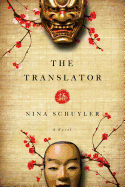
In Nina Schuyler's matryoshka-like The Translator, Hanne Schubert literally falls from grace due to her myopic approach to life and art. Hanne's tumble down a flight of stairs robs her of English, her native tongue, mysteriously leaving her with Japanese as her sole mode of speech. When Hanne comes to Tokyo to lecture on the art of translation, she is denounced as a fraud by the Japanese novelist whose work she lovingly and painstakingly translated. Hanne's subsequent escape to Kurashiki, a walled city with quaint Edo-period architecture, slowly restores her to health. This exile/rebirth also helps her to acknowledge her mistranslated text and her own estranged daughter--whose delicate sensibility she had cruelly, deliberately misread.
The Translator deftly illustrates literary translation as both a temporal (hence flawed) effort and a ceaseless drive to bridge time and space. The fact that there may be multiple translations for any given work means there is no perfect translation. Hanne's lesson in fidelity to the written word, and to her daughter's worldview, demands the willingness to transcend herself. Hanne must efface herself in order to understand, or "to come across" (i.e., translate) another reality. Schuyler's references to Noh theater, with its myriad of masks, are an apt comparison to translation as a Dionysian act of being outside oneself and yet at once with the world. --Thuy Dinh, editor, Da Mau magazine

